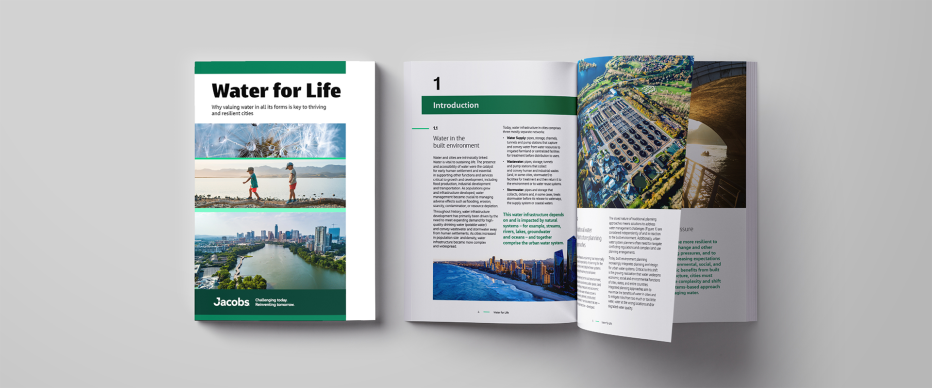Water for Life
Why valuing water in all its forms is key to thriving and resilient communities

Water has been fundamental to urban development, shaping early human settlements and underpinning essential activities such as food production and transportation.
As cities grew, effective water management became imperative to mitigate challenges like flooding and contamination. In today's climate-pressured world, a holistic approach to urban water management is vital.
Water for Life: Why valuing water in all its forms is key to thriving and resilient communities explores why the water system must consider water in all its forms – and the economic, social and environmental systems that depend on it – to better navigate the increased pressures of climate change and rapid urbanization and enhance resilience in our communities.
Water has always been a cornerstone of human settlement, supporting vital functions like food production, transportation, development and growth and — in more recent history — energy production and population health and wellbeing. Over time, the infrastructure required to supply and manage water in communities has become more complex.
Historically, water infrastructure planning has occurred independently of the built environment planning processes, despite them occupying the same physical space. This siloed approach means the solutions developed to overcome common water management challenges, such as flooding, water quality and scarcity, have been developed independently too.
Today, water supply and management in communities are under pressure from ongoing rising demand for domestic, industrial, recreational and agricultural uses and from the impacts of climate change. In responding to these challenges, the water sector has the opportunity to embrace OneWater thinking that values water in all its forms and recognizes water’s vital connections to land, food, energy and communities.
The water sector is also a contributor to climate change; producing greenhouse gas emissions in the form of direct emissions from wastewater treatment processes, energy use and embodied emissions in concrete, steel, plastics and other materials used in the construction of water infrastructure. Voluntary — and increasingly, mandated — Environmental, Social and Governance (ESG) approaches are emerging as a major catalyst for change too; helping the water sector consider the many complexities and interdependencies it faces and challenging how it responds to risks and evaluates impact.
As we grapple with the uncertainty that a changing climate presents to our future, we must leverage this disruptive period to embed highly collaborative and integrated approaches into planning and decision making to set the stage for a more resilient future.
About the authors

Craig Clifton is Jacobs’ global principal for resilience and climate change. He has a master’s degree in forest science and over 40 years’ experience in climate change and natural hazards vulnerability, risk and resilience. Craig works with a wide variety of public and private sector clients across transportation, defence, water and energy markets. He also works on opportunities to abate emissions or create carbon offsets in the land sector.

Jacobs Capability Lead for Climate Response & ESG, Genevieve Daneel has externsive experience in the resource recovery, water security, climate resilience and infrastructure sustainability sectors. Genevieve’s recent projects include working with the Victorian Government to advise on their circular economy policy, guiding the New South Wales (NSW) EPA on market opportunities for recycled organics and the future of mixed waste processing in NSW. Genevieve is currently leading a Water Resilience Collaboration series, hosting collaborative networking sessions for stakeholders from across the Australian and international water sector.

Jacobs’ OneWater Director Joseph Danyluk develops business, project delivery and thought leadership strategies focused on sustainable, equitable and resilient water management solutions. He works with communities and technical teams to develop and implement integrated solutions that not only provide near- and long-term benefits, but also demonstrate how water connects us and affects us all. For 20 years, he has supported clients with developing solutions for complex challenges affecting built and natural components of the water cycle.
Download the paper
Submit the form below to access the paper.












































